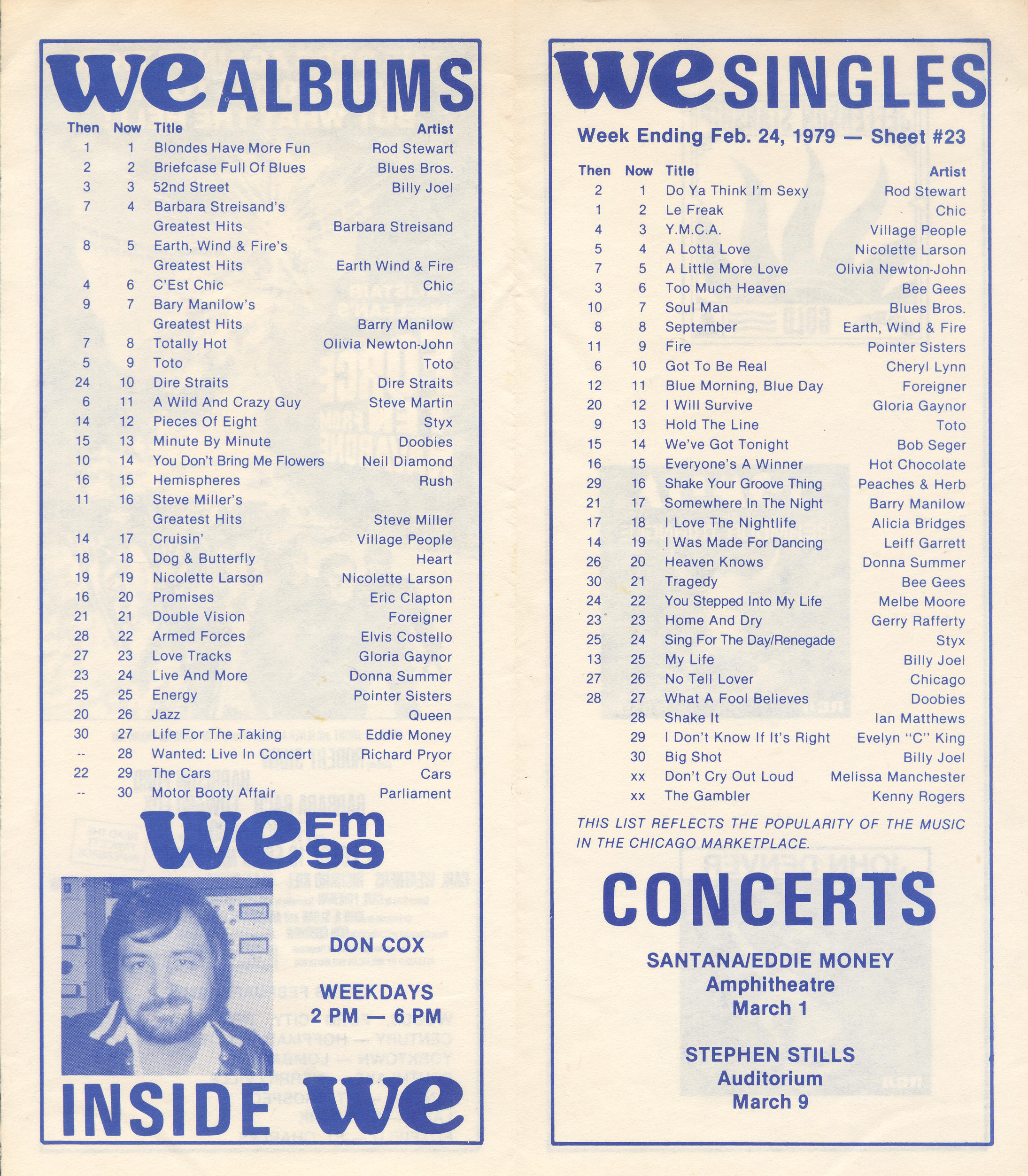
The Brief Blaze of a Rock Radio Revolution
In February 1978, Chicago’s radio dial experienced a seismic shift. WEFM, long known as a bastion of classical music, suddenly flipped to a rock and Top 40 format, sending shockwaves through the city’s vibrant radio landscape. Broadcasting from the John Hancock Center, one of Chicago’s most iconic skyscrapers, WEFM promised a fresh sound and bold energy. It captivated listeners and challenged established stations like WLS-FM and WLUP for a brief but unforgettable moment. Though its tenure as a Top 40 powerhouse was short-lived, WEFM’s impact reverberates in the memories of its audience and the annals of Chicago radio history.

The late 1970s were a dynamic time for Chicago radio. FM was on the rise, offering superior sound quality and attracting younger audiences eager for something new. Stations like WLS-FM dominated with polished Top 40 programming, while WLUP (The Loop) embraced rock with an edgier attitude. Into this competitive arena entered WEFM, a station with a storied past but an uncertain future.
Owned by General Cinema Corporation, WEFM had been synonymous with classical music for decades. However, by the mid-1970s, declining listenership and shifting demographics forced the station to reconsider its format. In February 1978, WEFM made its dramatic pivot to rock and Top 40, marking the beginning of its brief yet impactful run as “We-FM.”
WEFM’s origins date back to 1940, when Zenith Radio Corporation launched it as one of America’s first experimental FM stations. Its call letters honored Zenith founder Eugene F. McDonald, reflecting the company’s pioneering spirit. Initially broadcasting at 45.1 MHz before settling at 99.5 MHz in the early 1950s, WEFM became known for its classical programming and high-fidelity sound.
In 1972, the station relocated its studios and transmitter to the John Hancock Center, giving it unparalleled signal reach across Chicago and beyond. Despite these advantages, by the late ’70s, classical music was no longer financially viable for WEFM. General Cinema Corporation saw an opportunity to capitalize on FM’s growing popularity with younger audiences and decided to take the station in a bold new direction.
The transition from classical to Top 40 wasn’t just a change in programming—it was a complete reinvention of WEFM’s identity. On February 14, 1978, listeners tuning in for Beethoven or Bach were instead greeted by high-energy jingles and chart-topping hits from artists like Fleetwood Mac and The Bee Gees. The station adopted the slogan “We Plays Your Songs,” signaling its commitment to delivering exactly what its audience wanted.
The switch wasn’t without controversy. Loyal classical fans protested the change, even forming groups like the Citizens Committee to Save WEFM. However, for younger listeners hungry for fresh sounds and dynamic personalities, We-FM was an instant hit.
At the heart of WEFM’s success was its talented DJ lineup—a group of charismatic personalities who brought energy and authenticity to every broadcast.
-
: Known for his larger-than-life personality and quick wit, Cox became one of WEFM’s most recognizable voices. His ability to connect with listeners made him a standout talent during his tenure at the station.
-
: A seasoned broadcaster with a knack for engaging storytelling, Ryan played a key role in shaping WEFM’s sound and building listener loyalty.
-
: With his smooth delivery and encyclopedic knowledge of music, Stone added depth to WEFM’s programming while keeping things fun and accessible.
-
: Edmonds brought creativity and humor to his shifts, often incorporating listener call-ins and quirky segments that kept audiences entertained.
-
: As part of the original team, Camper helped establish We-FM’s identity through his approachable style and genuine enthusiasm for music.
Together, this team created an on-air chemistry that resonated with listeners and set We-FM apart from its competitors.
WEFM entered a fiercely competitive market dominated by heavyweights like WLS-FM (94.7) and WLUP (97.9). Each station brought its own unique flavor to Chicago’s airwaves:
-
: As an extension of its AM counterpart, WLS-FM offered polished Top 40 programming with massive promotional power behind it.
-
: Catering to rock fans with an edgier attitude, The Loop quickly became a cultural phenomenon thanks to personalities like Steve Dahl.
WEFM sought to carve out its niche by blending elements of both formats—delivering chart-topping hits alongside deeper rock cuts while maintaining an energetic presentation style.
Promotions played a crucial role in We-FM’s strategy. From concert ticket giveaways to live remotes at local events, the station worked tirelessly to engage listeners on multiple levels. One particularly memorable promotion involved a citywide scavenger hunt that had fans scouring Chicago for hidden prizes—a stunt that generated significant buzz and solidified We-FM’s reputation as an innovative player in the market.

For those who tuned into We-FM during its brief run as a Top 40 station, the memories remain vivid decades later. “It felt like they were playing music just for us,” recalls longtime listener Karen Mitchell. “They weren’t afraid to mix things up—you’d hear disco one minute and classic rock the next.”
Others remember the DJs as much as the music itself. “Don Cox had this way of making you feel like you were part of something special,” says former fan Mike Reynolds. “His energy was infectious—you couldn’t help but get excited when he was on.”
These personal connections highlight why We-FM continues to hold a special place in Chicago’s radio history despite its short lifespan.
Despite its initial success, We-FM faced significant challenges that ultimately led to its demise as a Top 40 station. Fierce competition from established players like WLS-FM made it difficult for We-FM to sustain momentum over time.
Additionally; internal conflicts within General Cinema Corporation coupled w/ increasing operational costs placed additional strain upon resources available towards maintaining innovative edge required competing effectively against rivals .
By early ’80s decision made revert back towards softer adult contemporary format effectively ending brief yet impactful experiment w/rock &Top40 programming .
Though short-lived ; legacy remains alive today thanks efforts enthusiasts preserving airchecks showcasing highlights unforgettable era . Platforms such AircheckRadio ensure future generations able experience firsthand magic created team behind scenes .
For those lucky enough witness firsthand ; memories remain vivid reminder power radio connecting people shared love music storytelling .
Written by: studio
CHICAGO DON COX FRANK RYAN WEFM
Similar posts
Recent Comments
No comments to show.-

Retro Rewind
With Kenneth Dell
For every Show page the timetable is auomatically generated from the schedule, and you can set automatic carousels of Podcasts, Articles and Charts by simply choosing a category. Curabitur id lacus felis. Sed justo mauris, auctor eget tellus nec, pellentesque varius mauris. Sed eu congue nulla, et tincidunt justo. Aliquam semper faucibus odio id varius. Suspendisse varius laoreet sodales.
close Top popular
© Copyright 2025 Aircheck Radio - is a proud listener supported 501(c)(3) nonprofit organization











